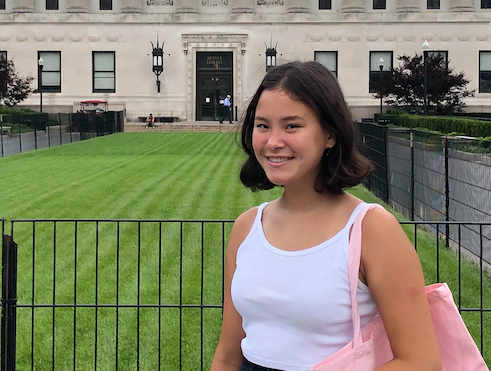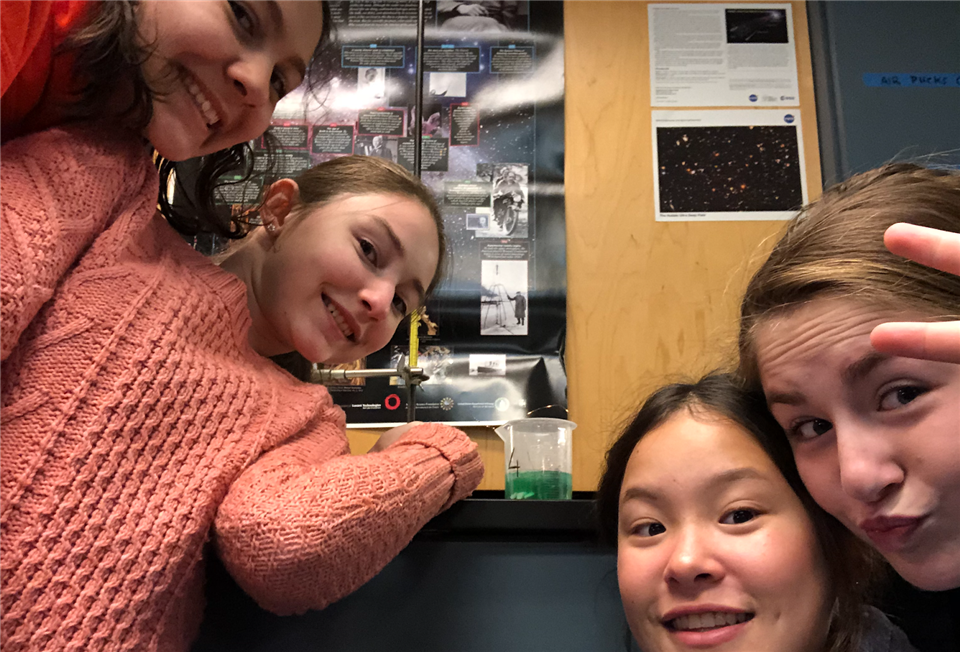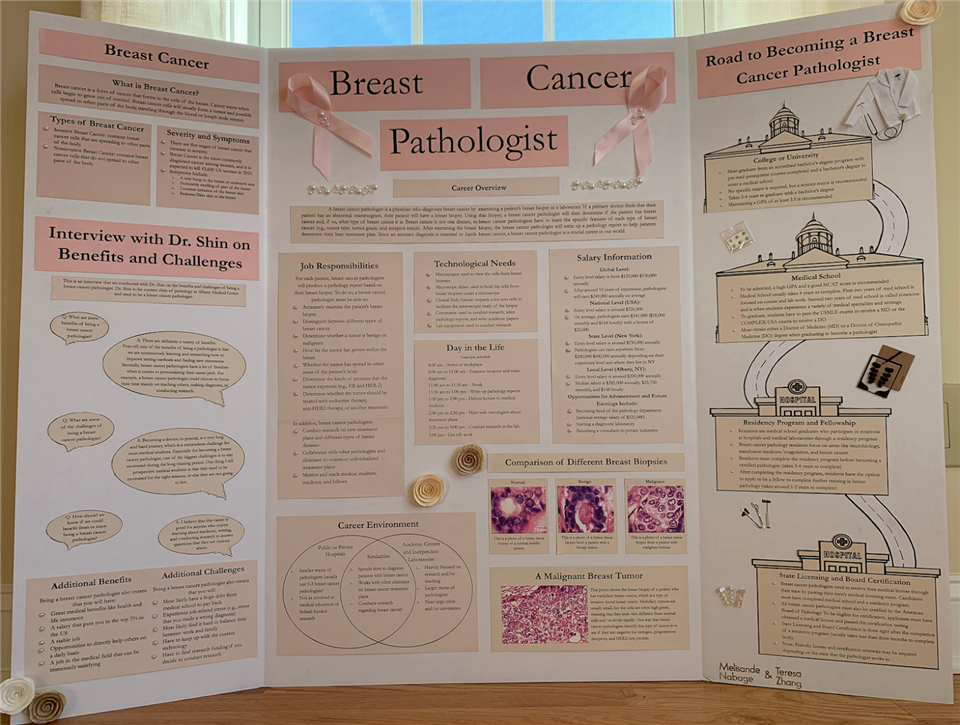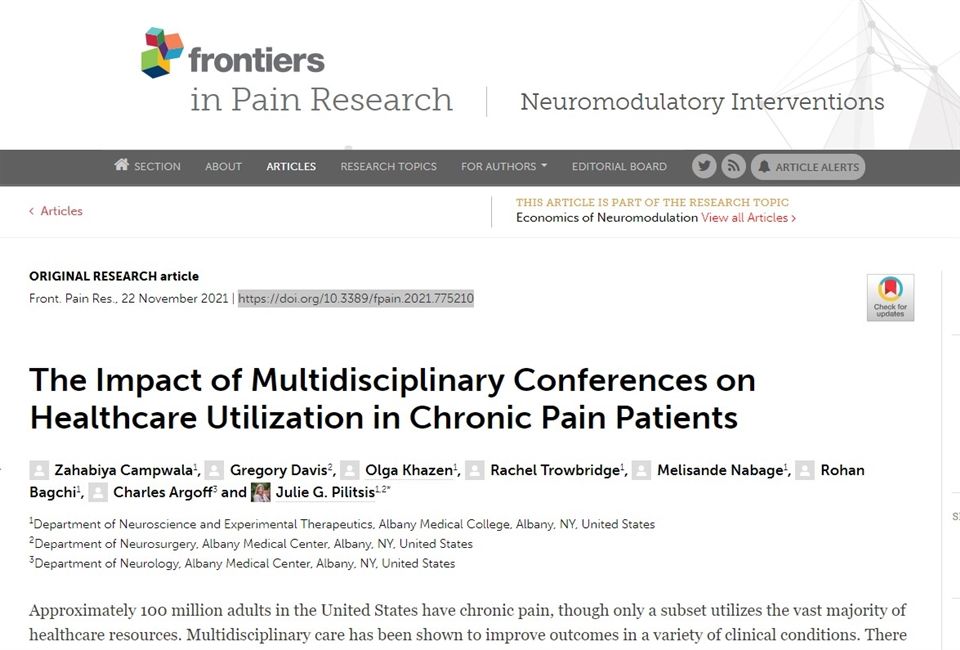Signature Spotlight: Publishing Neuroscience Research
2/21/2022
Meli N. ’23
Meli N. ’23 is pursuing a Signature project on “The Scientific Research Process in Neuroscience and Experimental Therapeutics.” Her work with Albany Medical College was recently recognized when she was included in the byline in an article published in Frontiers in Pain Research. Meli shares in her own words what inspired her work and what she’s learned thus far.
Interest in Science
To set the scene for my Signature project: I have always been interested in pursuing a career in science. My parents are both physicians, but their jobs are drastically different. Growing up, I found the range of work in the medical field to be exciting. There are so many different kinds of specialties to go into and positions to fill.
My interest in science really came to fruition during my freshman year at Emma Willard School. In middle school, I spent hours trying to memorize different forms of energy without truly knowing the depth behind them. My freshman physics class changed that mindset as I watched my textbook come to life through experiments. I found freshman physics to be a class that continuously asked me the question: Why is the world around us the way it is? From melting ice cubes to learning about the solubility of different solids, we touched on many topics that I had never wondered about before. And for every question that was answered, there were five more that I had to ask.
Flash forward to sophomore year. I have gained a new interest in science and I want to pursue it further. This is why my friend Teresa and I decided to start a HOSA: Future Health Professionals chapter here at Emma. We wanted to give people the opportunity to explore different aspects of science and/or medicine that they might not be able to do in class. I have had an amazing time running this club with Teresa these past two years. The projects I have completed in HOSA have also given me the opportunity to further my knowledge about professions in medicine and explore my career options.
Interning at Albany Medical College
My Signature project started in June 2021 when I started interning at Albany Medical College’s Department of Neuroscience and Experimental Therapeutics.
When I started my internship, I didn’t really know what I was getting myself into. On my first day, I was assigned a medical student to work with. Looking back, I have to give serious credit to him for being so patient with me throughout the process of me getting used to how the lab worked. I still vividly remember the first few days of my internship: I met with the med student, he sent me 25 pages worth of scientific articles to read, I read said articles and understood about 60% of the content. Getting accustomed to the medical terminology in dense research articles definitely takes time. Before that day, I didn’t even know what an abstract was.
Believe me when I say that the learning curve was steep. There was a definite divide between me and the med student I was working with—things that were second nature to him were a totally different language to me. For example, a citation service that we frequently utilize is called EndNote. I had to figure out how to use this on my own, in addition to figuring out formatting in Microsoft Word. Being introduced to this whole other world beyond what we do in school was jarring. At times, it felt like I had been thrown into the deep end of a pool without knowing how to swim.
Even when things got better and I actually got the hang of using EndNote, there was still so much work to be done. Fortunately, I was given access to resources that detailed how to write an introduction, abstract, etc., but reading about writing these sections can only do so much. It is a whole different can of worms to actually write said pieces of a research article. Every time I would send a draft, there were plenty of edits to be made and versions to be revised.
I spent my summer hunched over my computer, responding to comments and reading more articles. There were many times when I was discouraged, as I struggled to improve my writing throughout the different versions of papers. I felt so behind the people I was working with, as they were all so much older and more experienced than me. However, I did the only thing I could: my best. When I was asked to write a literature review, something I had never even heard of, I Googled “How to write a literature review” and pushed myself to produce a well-researched report. Eventually, my work paid off.
Published Research
In November 2021, a study that I had been working on was published in Frontiers in Pain Research. I started work on this paper in mid-July 2021. In this study, we looked at how the treatment of chronic pain patients by a wide variety of medical professionals affected the patients’ utilization of healthcare resources. If this doesn’t make any sense to you, that’s normal! I didn’t understand the study either until I was able to talk to the medical student running the write-up. The pieces often don’t click immediately; it is hard to see the framework and intent behind why a study is done unless you have read about previous research and know the problem at hand. In this case, the work was centered on how often chronic pain patients utilize the healthcare system and why that is usually ineffective.
Speaking generally, I think my favorite part of interning at AMC is being able to see the research process from start to finish. To quote from my Signature portfolio, “Developments in the medical world are constantly happening. You can easily read about them on PubMed. But what about research that is ongoing, or simply ideas for studies that haven't even been conducted yet?” Interning at AMC has taught me many invaluable things: how to read a scientific article and NOT pass out during the results section, how to assist in writing research manuscripts with actual researchers, and, most importantly, how to keep learning.
Throughout my time as an intern, I have been placed on four different projects. Every time I get comfortable working on one paper, I am added to another with a new focus and new people to work with. Then, I have to start from square one all over again: reading previous research on the topic. But I have learned to find excitement in the unknown. Switching from one study to another opens up a whole other world of literature for me to read. Today, I have read countless articles on chronic pain, spinal cord stimulation, deep brain stimulation, and more. It is especially cool when a study you have been a part of helps you understand what you read in a separate article—seeing ideas of neuromodulation interact and influence each other is incredible.
In addition to seeing how studies go from just an idea to being published in a journal, I have seen and worked with so many incredible people at AMC. From biomedical engineers to neurosurgeons, I have seen that many different professions assist in the research process for a single study.
If my experience as an intern has taught me one thing, it is that I want to spend my life learning how to push boundaries through research. I look forward to spending time studying what is already known so I can explore what is left to be discovered. I want to be a part of cutting-edge research where you do not know what results you will get, whether it be in medicine, engineering, or some other area of science. I want answers to all my questions that haven’t been resolved, even the ones dating back to my time in freshman physics. Although there are many parts of my future that are uncertain, I am certain that I will make time for what I love: science and the discovery that comes with it.
Thank you, Meli, for sharing your passion for scientific research. We look forward to seeing how you will use it to serve and shape your world!
To read more about Meli’s work, visit her Signature portfolio.

Meli N. '23 is pursuing a Signature project entitled The Scientific Research Process in Neuroscience and Experimental Therapeutics

Meli and her classmates embracing scientific experimentation in their 9th grade sludge lab

Meli's 10th grade HOSA project explored the path to becoming a breast cancer pathologist

Meli's first co-authored published work: "The Impact of Multidisciplinary Conferences on Healthcare Utilization in Chronic Pain Patients"














